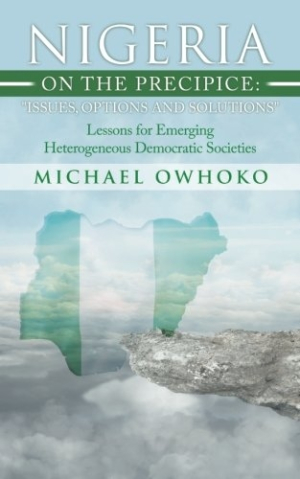Nigeria on the Precipice
Issues, Options, and Solutions: Lessons for Emerging Heterogeneous Democratic Societies
Drawing from history and more, Nigeria on the Precipice offers detailed proposals for the nation’s future.
Nigeria is a country on the rise. The population of Lagos, Nigeria’s largest city, is twenty-one million and growing. Unfortunately, as much as Nigeria is becoming comfortable in its new role as the leading nation of West Africa, it may be coming apart at the seams. That is the main thrust of scholar Michael Owhoko’s short book, Nigeria on the Precipice.
This geopolitical tract attempts to chart the rise of Nigeria, and trace the lessons the nation could bestow on the world. In particular, Nigeria could be the twenty-first century’s most important crucible for multiethnic capitalist democracies.
However, there are some major issues facing this emerging nation. Corruption is rife, with one strongman often replacing another, thus creating a vicious cycle of autocratic but ineffectual central government. On the periphery, Nigeria is actually a patchwork of many nations, with groups like the mostly-Muslim Hausa and mostly-Christian Igbo controlling different parts of the country. Sometimes this decentralized control can be weaponized, as in the case of the Islamist militant organization Boko Haram, or the failed Igbo state of Biafra that played such a central role in the bloody Nigerian Civil War of 1967-1970.
Owhoko’s book touches on this history and so much more. Nigeria on the Precipice also offers detailed solutions about what could save Nigeria before it falls over the cliff. Owhoko warns that easy solutions are no longer possible, especially since “It is becoming crystal clear that the current system lacks the built-in capacity to manage and give the people a common vision.”
Owhoko suggests confederalism or “proper” federalism. “Peaceful” balkanization is also proffered as a solution, but each one of these suggestions carries the threat of violence. After all, the Balkans have long been called the “tinder box” of Europe based on internecine conflicts involving tribe, land, and religion. Nigeria is no different, and it’s hard to see how anything less than a totalitarian dictatorship could maintain some semblance of normality in this often chaotic nation.
Nigeria on the Precipice is not a portrayal of potential disasters lying in wait for the developing nation. Owhoko writes with the clean precision of a reporter, but his arguments have a philosopher’s gravitas. If there is any failing here it is the book’s promotion of ethnic nationalism, which based on historical examples seems destined to result in violence, no matter how earnest an emphasis “peaceful” deconstruction might be.
Nigeria on the Precipice is a great rundown of modern Nigeria with political solutions that aim high.
Reviewed by
Benjamin Welton
Disclosure: This article is not an endorsement, but a review. The publisher of this book provided free copies of the book and paid a small fee to have their book reviewed by a professional reviewer. Foreword Reviews and Clarion Reviews make no guarantee that the publisher will receive a positive review. Foreword Magazine, Inc. is disclosing this in accordance with the Federal Trade Commission’s 16 CFR, Part 255.

